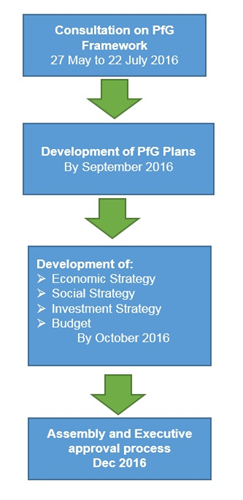Focus now shifts from Brexit to Programme for Government
05 July 2016 - by Claire FlynnWhile the pundits are still discussing the various scenarios and uncertainties of Brexit, we look ahead to the autumn and our own devolved government and its plan of work for the next five years.

Our MLAs will soon be off Assembly duties, returning to their constituencies for the two months of the summer (no immediate plans to hold emergency sessions), however many organisations have postponed their well -deserved holidays to put the finishing touches to their responses to the draft Programme for Government consultation which closes in three weeks’ time (22 July). Simultaneously, many civil servants, especially those designated ‘Senior Responsible Officers’ (SROs) for each Outcome, are working over the summer on their ‘Action Plans’ to give expression to the draft Outcomes.
Our new style PfG sets out 14 Outcomes which “best describe the society we wish to have”, then a set of 42 indicators and associated measurements which demonstrate progress towards the Outcomes. Our Executive needed and wants to do things differently.
Stratagem has been working with the Carnegie UK Trust on progressing its work on wellbeing in Northern Ireland. Carnegie UK also facilitated a roundtable to help politicians and civil servants grasp how economic, social, environmental and importantly democratic outcomes could improve wellbeing and be integrated into the 2016-2021 Programme for Government. Therefore it is not surprising that this PfG includes wellbeing as a core tenet throughout the document; putting wellbeing on par with economic strategy, which should give us a far deeper understanding of where we are as an economy and society.
Once the consultation on the outline framework is complete, a set of action plans will be published. These actions will be the concrete deliverables that will aim to move the indicators in the right direction and ultimately bring about the desired societal outcomes. Then after the first Consultation, there is a series of events over the coming months that will allow organisations to influence government policy, including a second Consultation on the PfG (action plans), the economic, social and investment strategies and the Budget. The Assembly will also be given the opportunity to debate the PfG which will allow the Opposition, and the smaller parties and independent MLAs to have their say.
The collaboration championed in the PfG is a challenge but an opportunity. The Executive is putting itself out there; asking for more participation in its policy-making process. So while there is great uncertainty about the fallout from Brexit, the PfG is a certain and constant opportunity to outline your manifesto asks and identify how your organisation can co-design and co-deliver programmes with the public sector.
The task at hand is how to respond with most impact to the new PfG format. As well as engaging with the relevant SROs, it will be crucial to underpin any response with sound evidence. Then it is all about planning for the next six critical months.
Time to roll up those sleeves and get to work!








